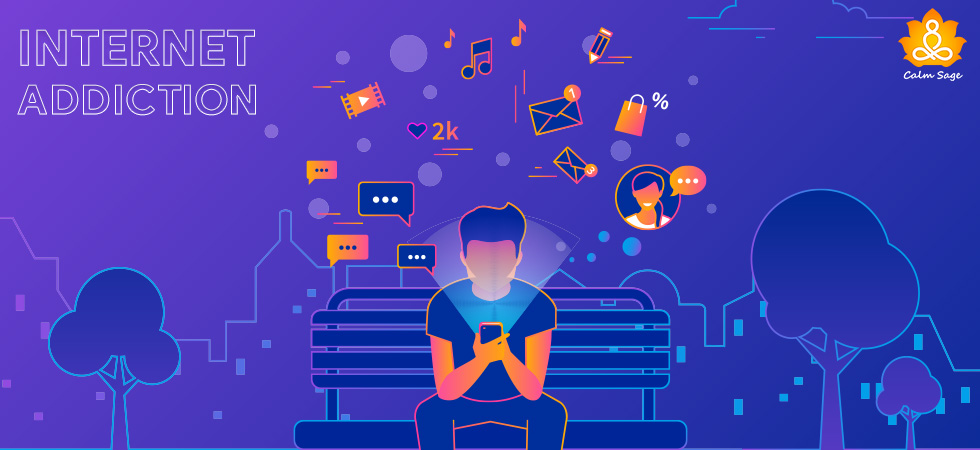Is Internet Addiction Disorder A ‘Hoax’ Disorder Or Is It Real?

In your free time, do you find yourself playing online games, doing some online shopping, or do you prefer simply scrolling through your social media? Is the excessive (and compulsive) use of your phone or computer interfering with your daily life?
If your answer is yes, then you may be struggling with Internet Addiction Disorder, also known as compulsive internet use, internet use disorder, or as Dr. Larry Rosen described – iDisorder.
While not officially recognized as a disorder in the DSM-5, the disorder is becoming more and more common. Internet addiction disorder is a growing concern in many nations especially in Asia, North America, and Europe.
In this article, let’s explore what is internet addiction, signs of internet addiction, its causes, how it affects your mental health, and what to do to cope with internet addiction.
How Can You Define Internet Addiction?

Internet addiction is a type of behavioral addiction wherein you depend on the use of the internet, including using online devices. This kind of addiction is an unhealthy way of coping with your stresses and can leave a negative impact on your overall health.
While the concentration of this disorder is on the internet, other behavioral addictions such as media addiction, radio, or TV addiction can also come under this category.
With the advent of the digital age, internet addiction or internet addiction disorder is becoming difficult to diagnose. When you’re constantly surrounded by technology, how can you differentiate your need from addiction? In today’s age and day, we all need the internet to complete our daily tasks.
Want to order dinner? Online delivery is here! Want to research for your term paper? Why worry when the internet library is available? And now, during the pandemic, the internet is what you need to reach out to your loved ones and even medical services.
This is why internet addiction disorder can be a cause of concern. It’s hard to get by in today’s age when everything you need, everything you’re dependent on, is on or through the internet. Answer me honestly, can you live a day without the internet?
However, just because you use the internet in your daily life, doesn’t necessarily mean that you are struggling with an internet addiction disorder. The problem arises when your dependency on the internet begins to affect your daily life – relationships, work, and school.
The most common types of internet addiction can include social media networking, blogging, and online shopping. The issue is not the amount of time you spend on the internet, it’s about how you use the internet.
Signs & Symptoms Of Internet Addiction

Signs of internet addiction can manifest as physical and emotional symptoms. Some of the emotional symptoms may include:
- Depression
- Feeling guilty
- Anxiety
- Feeling euphoric when using the internet
- Social isolation
- Poor time management
- Getting defensive
- Poor productivity at work
- Getting agitated
- Mood swings
- Loneliness
- Boredom
Physical symptoms can be:
- Backache
- Carpal tunnel syndrome
- Frequent headaches
- Insomnia
- Poor weight management
- Poor personal hygiene
- Neck pain
- Dry eyes
What Causes Internet Addiction?

We can’t exactly pinpoint a single cause of the internet addiction disorder as many troubling factors can contribute to this disorder. According to some studies, it can be concluded that when you’re struggling with internet addiction, your brain makeup can look a lot like when it struggles with other dependency disorders such as alcohol use disorder.
Internet addiction disorder can affect your pleasure center, releasing dopamine. Dopamine, the feel-good hormone, is released when you experience or engage in something pleasurable; for example, in this case, scrolling through your social media.
With time, you may come to relate dopamine release with internet use, and when you realize that the more you spend time online either playing or shopping, the more dopamine you get. This can create a dependency.
Another factor can be the reward response. The reason why you’re so addicted to the internet is that it brings many rewards. For example, the more time you spend on Instagram, the more good news you hear. Or sometimes the reason behind your addiction to Facebook can be because you’re invested in the stories your friends share. The rewards you come to expect can make you come back to the complex world of the internet.
Another reason why you’re addicted to the internet can be because you’re depressed or anxious and using the internet is helping you relieve your symptoms. Similarly, if someone is struggling with social anxiety, they are more likely to become addicted to the internet.
How Internet Addiction Affects Mental Health
When your excessive usage of the internet begins to affect your relationships, work, school, or social life, it’s when you need to be concerned. Internet addiction can often leave you feeling exhausted and drained.
When you stay up late and ignore your body’s sleep needs, then you’re making yourself prone to sleep deprivation. Not only sleep is affected but because of your internet addiction, your finances can suffer too especially if your internet addiction is more along the lines of online gambling, online shopping, etc.
Internet Addiction in Children And Teenagers

Internet addiction can be a challenging disorder when it comes to children and teens. The young ones are unaware of the risks of using the internet and if their internet usage is not monitored then they can be at risk. During the last two years, the majority of children – including pre-teens and teenagers, were asked to move their studies online.
While many parents can rest assured knowing that they can track their children’s internet usage and their children can easily reach out to them if they’re in trouble, the consequences of internet addiction are still huge.
Children are becoming more and more dependent on the internet to satisfy their curiosity and stay connected with their friends and peers. Teenagers with access to personal computers are at the risk of cyberbullying – as a victim or as a perpetrator.
Is Your Child Addicted To Their Cell Phone? Read here!
Coping With Internet Addiction
The first thing to do when it comes to coping with internet addiction is to admit that you have an addiction. If you don’t think the problem exists, the solution to the said problem will be hard to find.
Treatment for internet addiction is there but there are not many services available. A psychologist with experience in dealing with behavioral addiction can help. Therapy approaches that can help treat internet addiction can include:
- Individual or group therapy
- Dialectical-behavioral therapy (DBT)
- Cognitive-behavioral therapy (CBT)
- Art therapy
- Recreational therapy
Other options can include prescribing antidepressants or anti-anxiety medications as many times, your internet addiction can stem from your existing depressive disorder or other anxiety disorders.
Internet addiction can also co-occur with other behavioral addictions including work addiction, media addiction, or smartphone addiction.
Internet Addiction: A Hoax Or Reality?

Originally, internet addiction was declared a hoax disorder but as we advance in technology and the internet, internet addiction disorder has become our reality. Even now, researchers are uncertain whether internet use disorder can be called a separate disorder or as a symptom of other underlying mental health disorders.
Making things difficult is the constant dependency on the internet these days. Many times, it can become a challenging task to differentiate between online and offline worlds. Everything – from buying groceries to seeking medical help and from attending classes to celebrating weddings is online.
It is hard to distinguish addiction from your daily necessities but however you take it, addiction to the internet can have many negative effects on your health – mental, emotional, and physical. Whether we like to believe it or not, internet addiction is real and can leave us with long-lasting negative side effects, if we’re not careful.
I hope this blog was able to help you understand the sad reality of internet addiction disorder and how it can affect your daily life. If you’d like to share your thoughts, you can write to us at info@calmsage.com or you can comment your views below.
Liked this article? Give us a thumbs up and don’t forget to share this article with your friends.
Take care.




















